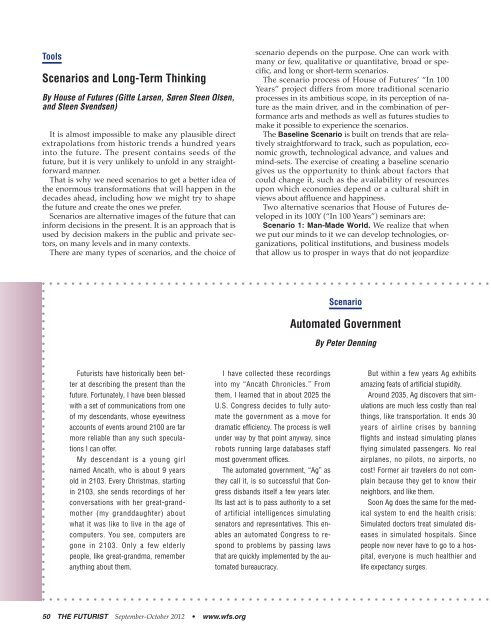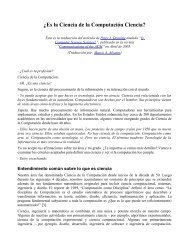The 22nd Century at First Light - the denning institute
The 22nd Century at First Light - the denning institute
The 22nd Century at First Light - the denning institute
Create successful ePaper yourself
Turn your PDF publications into a flip-book with our unique Google optimized e-Paper software.
Tools<br />
Scenarios and Long-Term Thinking<br />
By House of Futures (Gitte Larsen, Søren Steen Olsen,<br />
and Steen Svendsen)<br />
It is almost impossible to make any plausible direct<br />
extrapol<strong>at</strong>ions from historic trends a hundred years<br />
into <strong>the</strong> future. <strong>The</strong> present contains seeds of <strong>the</strong><br />
future, but it is very unlikely to unfold in any straightforward<br />
manner.<br />
Th<strong>at</strong> is why we need scenarios to get a better idea of<br />
<strong>the</strong> enormous transform<strong>at</strong>ions th<strong>at</strong> will happen in <strong>the</strong><br />
decades ahead, including how we might try to shape<br />
<strong>the</strong> future and cre<strong>at</strong>e <strong>the</strong> ones we prefer.<br />
Scenarios are altern<strong>at</strong>ive images of <strong>the</strong> future th<strong>at</strong> can<br />
inform decisions in <strong>the</strong> present. It is an approach th<strong>at</strong> is<br />
used by decision makers in <strong>the</strong> public and priv<strong>at</strong>e sectors,<br />
on many levels and in many contexts.<br />
<strong>The</strong>re are many types of scenarios, and <strong>the</strong> choice of<br />
Futurists have historically been better<br />
<strong>at</strong> describing <strong>the</strong> present than <strong>the</strong><br />
future. Fortun<strong>at</strong>ely, I have been blessed<br />
with a set of communic<strong>at</strong>ions from one<br />
of my descendants, whose eyewitness<br />
accounts of events around 2100 are far<br />
more reliable than any such specul<strong>at</strong>ions<br />
I can offer.<br />
My descendant is a young girl<br />
named Anc<strong>at</strong>h, who is about 9 years<br />
old in 2103. Every Christmas, starting<br />
in 2103, she sends recordings of her<br />
convers<strong>at</strong>ions with her gre<strong>at</strong>-grandmo<strong>the</strong>r<br />
(my granddaughter) about<br />
wh<strong>at</strong> it was like to live in <strong>the</strong> age of<br />
computers. You see, computers are<br />
gone in 2103. Only a few elderly<br />
people, like gre<strong>at</strong>-grandma, remember<br />
anything about <strong>the</strong>m.<br />
50 THE FUTURIST September-October 2012 • www.wfs.org<br />
scenario depends on <strong>the</strong> purpose. One can work with<br />
many or few, qualit<strong>at</strong>ive or quantit<strong>at</strong>ive, broad or specific,<br />
and long or short-term scenarios.<br />
<strong>The</strong> scenario process of House of Futures’ “In 100<br />
Years” project differs from more traditional scenario<br />
processes in its ambitious scope, in its perception of n<strong>at</strong>ure<br />
as <strong>the</strong> main driver, and in <strong>the</strong> combin<strong>at</strong>ion of performance<br />
arts and methods as well as futures studies to<br />
make it possible to experience <strong>the</strong> scenarios.<br />
<strong>The</strong> Baseline Scenario is built on trends th<strong>at</strong> are rel<strong>at</strong>ively<br />
straightforward to track, such as popul<strong>at</strong>ion, economic<br />
growth, technological advance, and values and<br />
mind-sets. <strong>The</strong> exercise of cre<strong>at</strong>ing a baseline scenario<br />
gives us <strong>the</strong> opportunity to think about factors th<strong>at</strong><br />
could change it, such as <strong>the</strong> availability of resources<br />
upon which economies depend or a cultural shift in<br />
views about affluence and happiness.<br />
Two altern<strong>at</strong>ive scenarios th<strong>at</strong> House of Futures developed<br />
in its 100Y (“In 100 Years”) seminars are:<br />
Scenario 1: Man-Made World. We realize th<strong>at</strong> when<br />
we put our minds to it we can develop technologies, organiz<strong>at</strong>ions,<br />
political institutions, and business models<br />
th<strong>at</strong> allow us to prosper in ways th<strong>at</strong> do not jeopardize<br />
I have collected <strong>the</strong>se recordings<br />
into my “Anc<strong>at</strong>h Chronicles.” From<br />
<strong>the</strong>m, I learned th<strong>at</strong> in about 2025 <strong>the</strong><br />
U.S. Congress decides to fully autom<strong>at</strong>e<br />
<strong>the</strong> government as a move for<br />
dram<strong>at</strong>ic efficiency. <strong>The</strong> process is well<br />
under way by th<strong>at</strong> point anyway, since<br />
robots running large d<strong>at</strong>abases staff<br />
most government offices.<br />
<strong>The</strong> autom<strong>at</strong>ed government, “Ag” as<br />
<strong>the</strong>y call it, is so successful th<strong>at</strong> Congress<br />
disbands itself a few years l<strong>at</strong>er.<br />
Its last act is to pass authority to a set<br />
of artificial intelligences simul<strong>at</strong>ing<br />
sen<strong>at</strong>ors and represent<strong>at</strong>ives. This enables<br />
an autom<strong>at</strong>ed Congress to respond<br />
to problems by passing laws<br />
th<strong>at</strong> are quickly implemented by <strong>the</strong> autom<strong>at</strong>ed<br />
bureaucracy.<br />
Scenario<br />
Autom<strong>at</strong>ed Government<br />
By Peter Denning<br />
But within a few years Ag exhibits<br />
amazing fe<strong>at</strong>s of artificial stupidity.<br />
Around 2035, Ag discovers th<strong>at</strong> simul<strong>at</strong>ions<br />
are much less costly than real<br />
things, like transport<strong>at</strong>ion. It ends 30<br />
years of airline crises by banning<br />
flights and instead simul<strong>at</strong>ing planes<br />
flying simul<strong>at</strong>ed passengers. No real<br />
airplanes, no pilots, no airports, no<br />
cost! Former air travelers do not complain<br />
because <strong>the</strong>y get to know <strong>the</strong>ir<br />
neighbors, and like <strong>the</strong>m.<br />
Soon Ag does <strong>the</strong> same for <strong>the</strong> medical<br />
system to end <strong>the</strong> health crisis:<br />
Simul<strong>at</strong>ed doctors tre<strong>at</strong> simul<strong>at</strong>ed diseases<br />
in simul<strong>at</strong>ed hospitals. Since<br />
people now never have to go to a hospital,<br />
everyone is much healthier and<br />
life expectancy surges.



